 Petzlover
Petzlover Kanni is originated from India but Pomeranian is originated from Germany. Kanni may grow 39 cm / 16 inches higher than Pomeranian. Kanni may weigh 18 kg / 40 pounds more than Pomeranian. Both Kanni and Pomeranian has same life span. Kanni may have more litter size than Pomeranian. Kanni requires Low Maintenance. But Pomeranian requires Moderate Maintenance
Kanni is originated from India but Pomeranian is originated from Germany. Kanni may grow 39 cm / 16 inches higher than Pomeranian. Kanni may weigh 18 kg / 40 pounds more than Pomeranian. Both Kanni and Pomeranian has same life span. Kanni may have more litter size than Pomeranian. Kanni requires Low Maintenance. But Pomeranian requires Moderate Maintenance
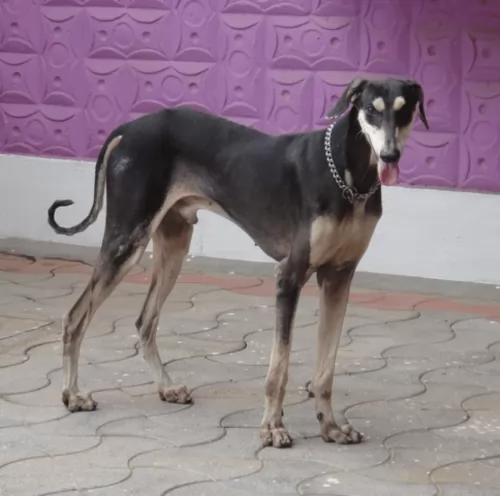 The Kanni dog is a rare South Indian Sighthound. It is also known as the Maiden's Beastmaster and this is because it is known to be protector and defender of its owner's property.
The Kanni dog is a rare South Indian Sighthound. It is also known as the Maiden's Beastmaster and this is because it is known to be protector and defender of its owner's property.
During ancient times, the dog was used for hunting but today it is essentially kept as a pet and it is registered with the Kennel Club of India.
 Pomeranian dog Known as the Pom and classified as a toy dog breed, the Pomeranian comes from the Spitz dog from the Arctic regions. It is thought that the dog is descended from larger Spitz-type dogs, and more specifically the German Spitz.
Pomeranian dog Known as the Pom and classified as a toy dog breed, the Pomeranian comes from the Spitz dog from the Arctic regions. It is thought that the dog is descended from larger Spitz-type dogs, and more specifically the German Spitz.
It appears to be an ancient dog breed because there are recordings of its existence from 1764 already. This little dog is thought to have got his name from the area known as Pomeranian in Northern Poland as well as along the Baltic Sea, Germany.
The first breed club for this dog was established in England in 1891. Not long afterwards the first breed standard was written. In the standard published in 1998, The Pomeranian Dog is categorized in the German Spitz standard.
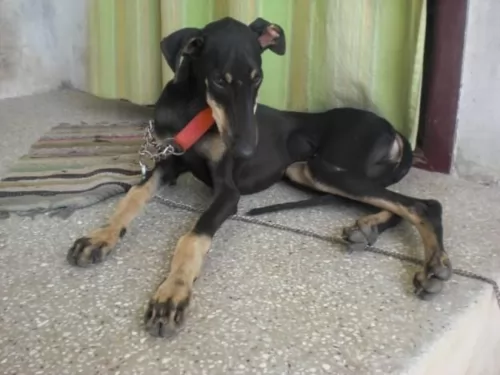 These dogs are tall, slim and deep chested, coming in two-color combinations, but it is the black and tan variety that is the true Kanni. There is also a cream variety. There are other color variations and each color has a unique name connected to it. The coat of the Kanni is short and smooth.
These dogs are tall, slim and deep chested, coming in two-color combinations, but it is the black and tan variety that is the true Kanni. There is also a cream variety. There are other color variations and each color has a unique name connected to it. The coat of the Kanni is short and smooth.
They are medium sized dogs standing at 62 to 67cm at the withers and weighing in the region of 18 – 22kg. When you first look at these dogs you might think of them as being similar to a Greyhound in looks. This is also because of their lean, muscular looks.
The eyes are a golden color, the nose black and the ears are a medium size and floppy with the long tail being semi-curved.
The Kanni has always been a hunting dog so he is used to being sharp, strong-willed, independent and alert as well as having some aggressive tendencies. It is also quite a reserved dog but he shows love and loyalty to his owner. He is independent and easy to train. It is a good thing to have him trained and socialized so that he is obedient to the simple commands you give him.
 This is such a sweet little dog, full of good cheer and with such a bright little face. He weighs between 1.5kg and 4kg and stands at anything between 17 and 28cm in height.
This is such a sweet little dog, full of good cheer and with such a bright little face. He weighs between 1.5kg and 4kg and stands at anything between 17 and 28cm in height.
He is such a compact little fluff ball with sharp erect ears and a fox like appearance with a well feathered tail that curls up over the dog’s back.
The coat is thick and spritely, not lying flat but standing up around the dog. Coats can be nearly any color, but the most common is tan, reddish, orange or you get a mix of cream tan and black.
When you look into the bright little face of the Pomeranian Puppy, you can see that he is a true extrovert. He is social and has a huge personality. They’re bright, eager, feisty, loving and loyal.
Full of fun and very intelligent, they may be small and cute, but training and socialization will do him the world of good as it means you can take him anywhere with you and he’ll be well behaved. They grow attached to their owners and want to protect them.
They can be somewhat aloof with strangers and its this wariness around them that makes them good watchdogs. They get on well with children in the home and are prepared to make friends with other pets in the family too.
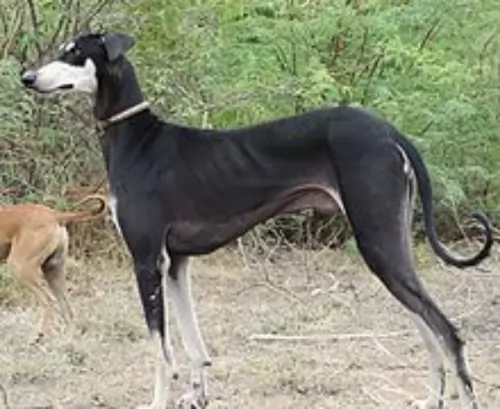 The Kanni looks much like your regular Doberman Pinscher but he has long tail and floppy ears. He is slim and agile but also powerful being able to have bursts of speed. It is why he requires a large place to run and play in, being better suited to a home with a large garden or farm.
The Kanni looks much like your regular Doberman Pinscher but he has long tail and floppy ears. He is slim and agile but also powerful being able to have bursts of speed. It is why he requires a large place to run and play in, being better suited to a home with a large garden or farm.
He is a playful, quiet dog but he has quite a bark on him and is known to be a good watchdog because of this. He is a protective dog too, devoted and loyal and making a splendid family pet.
 Pomeranians are such bright, friendly little dogs and they’re also active. These loving dogs are also intelligent so you can easily teach him some simple commands such as sit or lie down.
Pomeranians are such bright, friendly little dogs and they’re also active. These loving dogs are also intelligent so you can easily teach him some simple commands such as sit or lie down.
He won’t want to lie down for too long though because he’s full of beans.
He’s alert too so he makes a good watchdog. When you bring one of these dogs into your home as a pet and companion animal, you won’t be disappointed as he’s got a whole lot of love to give.
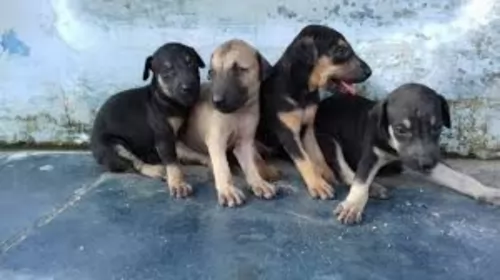 Not much is known about inherited health problems in this breed, and he can live up to a ripe old age of 16. It seems a pretty healthy dog, but still it helps to be aware of some of the more common dog illnesses that your pet can succumb to.
Not much is known about inherited health problems in this breed, and he can live up to a ripe old age of 16. It seems a pretty healthy dog, but still it helps to be aware of some of the more common dog illnesses that your pet can succumb to.
For first time dog owners it can be difficult knowing what health problems our beloved pets could suffer from. Every dog breed has certain diseases to which they are more prone to, but these are some common issues that most of our 4-legged friends will face -
This is a common dog health problem in India with the Kanni. There are so many things that disagree with their digestion. Most dogs may not want to eat their next meal, but when he is lethargic, he is hot and is vomiting, it is time to get your pet to the vet. This is because diarrhea causes rapid dehydration in dogs. To avoid diarrhea, steer clear of certain foods such as milk and dairy products as well as old, spoiled fatty foods. With diarrhea your dog must always have access to fresh, cool water.
This is a common dog disease, and ear infections can be painful and frustrating for your pet. He’ll scratch at his ear, shake his head and the inside of the ear may be red with a discharge. Check his ears for redness and try to keep them free from wax build up and dust.
Cleaning the ear is quite simple, and if you’re not sure how, the vet can do it quickly and effectively. Usually some dog ear cleaning solution on some cotton wool can do the trick. Ear infections are common in dogs like the Kanni with floppy ears.
It is essential to control fleas on your dog from word go. Fleas thrive in warm temperature and humidity and your pet will scratch, bite and lick at the spot. When you brush your pet, look through his fur for fleas and tell you vet about it if you discover ticks and fleas. A topical ointment could nip the problem in the bud. You may want to consider a flea collar for your pet.
Tapeworms, hookworms and roundworms for instance are commonly found in dogs, and even for healthy dogs, deworming tablets should be given from time to time. If your dog has worms, you’ll notice lethargy, loss of appetite, diarrhea and vomiting. It may be time to get your pet to the vet.
 Your little Pomeranian Puppy is a sturdy dog who isn’t going to battle too much with health issues. With good care such as good food and exercise, the Pomeranian can reach 12 – 16 years of age.
Your little Pomeranian Puppy is a sturdy dog who isn’t going to battle too much with health issues. With good care such as good food and exercise, the Pomeranian can reach 12 – 16 years of age.
Some of the most common health issues you might come across
This problem comes about when the ridges which form the patella groove in the knee aren’t deep enough to allow the patella to sit securely. This causes the patella to move out of the groove. While the muscles are contracted, the patella isn’t able to return to the correct position.
Pomeranians Dogs are prone to quite a few eye problems such as tear duct problems and cataracts. As a responsible dog owner, take your pet to the vet if you suspect eye problems.
The trachea carries air to the lungs and it can collapse. Your dog will have a chronic, dry cough and this can be brought about when people tug on their dog's leash.
Every little dog battles with teeth and gum problems which can lead to early tooth loss. When you brush your Pomeranian, make a point of checking inside his mouth too, as a bad tooth can cause pain but also all kinds of health problems.
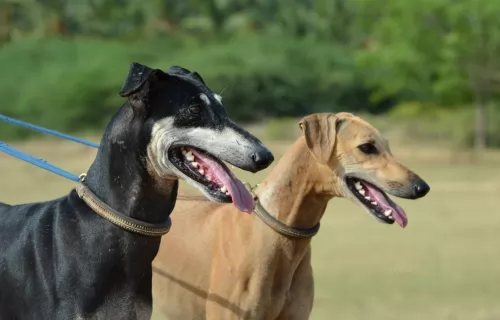 The Kanni is a low maintenance dog with his short coat. You can give him a good brush twice a week, check that his nails don't grow too long and also check his ears inside and out. Ticks and fleas are rife in hot weather and you want to give your dog a thorough check for these. You should also be checking your dog's teeth and brushing them 2 or 3 times a week. Dental problems can cause havoc with your dog's health.
The Kanni is a low maintenance dog with his short coat. You can give him a good brush twice a week, check that his nails don't grow too long and also check his ears inside and out. Ticks and fleas are rife in hot weather and you want to give your dog a thorough check for these. You should also be checking your dog's teeth and brushing them 2 or 3 times a week. Dental problems can cause havoc with your dog's health.
As a hunting breed, the Kanni is used to running so his needs for a good amount of exercise are quite high. While they do make good family pets, they hanker after wide open spaces and being busy. If you own one of these dogs, make sure that you exercise him often because otherwise he becomes frustrated and unhappy.
This dog has always been used to village life where he is free to roam wide open spaces. He is much more suited to country life than to city life, and as a pet, you will need to ensure that he receives a good amount of exercise.
Take him for walks, and if he's been socialized and trained, take him to the park and allow him off his leash to run.
The dog has always been fed traditional food such as porridge and milk but we know better now that dogs need protein too as well as a diet rich in vitamins and minerals to ensure his health.
You can feed him a top quality commercially manufactured dog food and add in some cooked chicken, rice and vegetables from time to time. It is expensive, but if you can, try and add in some raw meat occasionally as well. Your Kanni dog must always have access to fresh, clean water.
 Pomeranians Dogs have a thick, double coat, so you will need to invest in a decent brush so that you can brush him. He is a shedder so this is an important part of grooming. Some people prefer to take the dog to the groomers and have the coat professionally cut.
Pomeranians Dogs have a thick, double coat, so you will need to invest in a decent brush so that you can brush him. He is a shedder so this is an important part of grooming. Some people prefer to take the dog to the groomers and have the coat professionally cut.
Your cute little Pomeranian isn't the kind of dog to spend too much time asleep on the couch. He is energetic and full of beans and he will wait anxiously for you to take down his leash and take him on a walk. In indoors his bright little face will be watching yours to see if there’s any chance of a ball game.
People never know if they should feed their dogs dry kibble, semi-moist or canned dog food. Homemade food is always good, but if you opt to also use commercially manufactured dog food, go for the good quality ones that have vitamins and minerals in them.
Every dog needs a good balance of protein, carbs, minerals, fats, vitamins and trace elements. People often get all worked up over feeding their pets when it can be so simple.
Use a high quality dry kibble, but now and then add some home-made cooked food into it as a treat – about once or twice a week. Boil some chicken, brown rice, sweet potato, carrots and spinach and add this in to the dry kibble.
Every now and then a little bit of raw meat will also do your pet the world of good. What could be more simple than this? Nutritious, tasty and healthy, and your pet will thrive on it.
Make sure he always has a bowl of fresh, cool water close by.